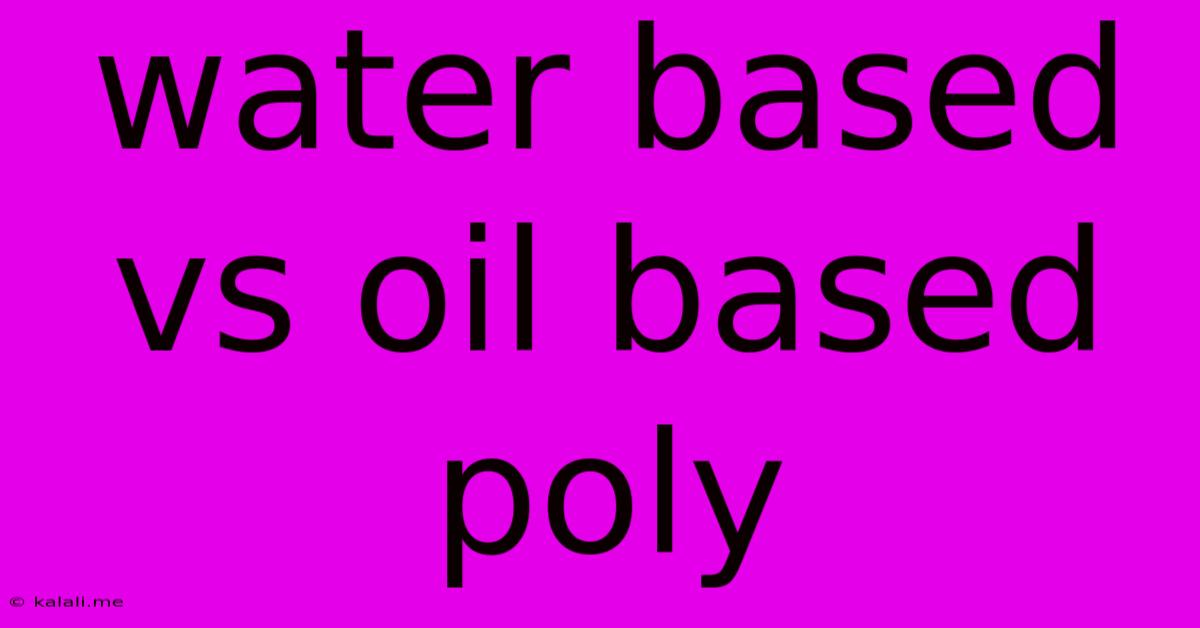Water Based Vs Oil Based Poly
Kalali
May 28, 2025 · 3 min read

Table of Contents
Water-Based vs. Oil-Based Polyurethane: Which is Right for Your Project?
Choosing between water-based and oil-based polyurethane can feel overwhelming. Both offer durable finishes for wood, but they differ significantly in application, drying time, cleanup, and overall finish appearance. This guide breaks down the key differences to help you select the best option for your specific project. Understanding these differences will ensure a successful finish every time.
What is Polyurethane?
Polyurethane is a protective coating used to seal and protect wood surfaces, providing a durable, resistant layer against scratches, water damage, and everyday wear and tear. It's available in both water-based and oil-based formulas, each with its own set of advantages and disadvantages.
Water-Based Polyurethane: The Eco-Friendly Choice
Water-based polyurethane has gained significant popularity due to its low VOC (volatile organic compound) content, making it a more environmentally friendly option. This translates to less strong odor during application and faster drying times compared to oil-based counterparts.
Pros of Water-Based Polyurethane:
- Low Odor: Significantly less pungent smell than oil-based poly. This is ideal for indoor projects and those sensitive to strong fumes.
- Faster Drying Time: Dries much quicker, allowing for quicker project completion and multiple coats in a shorter time frame.
- Easy Cleanup: Cleans up easily with soap and water, eliminating the need for harsh solvents.
- Environmentally Friendly: Lower VOC content contributes to better indoor air quality.
- Excellent Durability: Modern water-based polyurethanes offer comparable durability to oil-based options, especially when multiple coats are applied.
Cons of Water-Based Polyurethane:
- Less forgiving: Can show brush strokes more easily if not applied carefully. Requires a smooth application technique.
- Can raise the grain: May cause the wood grain to raise slightly, requiring light sanding between coats.
- May be less durable in high-traffic areas: While modern formulas are improving, it may not be as durable as oil-based in extreme conditions.
Oil-Based Polyurethane: The Traditional Choice
Oil-based polyurethane has been a long-standing favorite for its durability and smooth finish. However, it comes with a stronger odor and longer drying times.
Pros of Oil-Based Polyurethane:
- Extremely Durable: Offers superior durability and protection, especially in high-traffic areas or outdoor applications.
- Self-Leveling: Often self-levels to a smoother finish, minimizing brush strokes.
- More forgiving: Less prone to showing brush marks, allowing for a more relaxed application.
Cons of Oil-Based Polyurethane:
- Strong Odor: Has a strong, pungent smell that requires good ventilation during application and drying.
- Slow Drying Time: Dries much slower than water-based polyurethane, extending project completion time.
- Difficult Cleanup: Requires mineral spirits or paint thinner for cleanup, adding extra steps and potential environmental concerns.
- Yellowing: Oil-based poly tends to yellow over time, especially when exposed to UV light.
Choosing the Right Polyurethane: A Summary
The best choice depends entirely on your project needs and priorities.
-
Choose water-based polyurethane for:
- Interior projects where low odor and quick drying time are crucial.
- Projects where environmental friendliness is a priority.
- Projects where you want an easier cleanup process.
-
Choose oil-based polyurethane for:
- High-traffic areas or outdoor applications requiring maximum durability.
- Projects where a self-leveling finish is desired.
- Projects where you prioritize a longer-lasting, highly protective finish.
Ultimately, both water-based and oil-based polyurethanes offer excellent protection for wood. By carefully weighing the pros and cons of each, you can confidently select the ideal finish for your next woodworking project. Remember to always follow the manufacturer's instructions for best results.
Latest Posts
Latest Posts
-
May As Well Or Might As Well
May 29, 2025
-
Pitbull Mixed With A Bull Terrier
May 29, 2025
-
How Do I Find My Septic Tank Lid
May 29, 2025
-
Git Update Local Branch From Remote
May 29, 2025
-
How Do You Say Table In Spanish
May 29, 2025
Related Post
Thank you for visiting our website which covers about Water Based Vs Oil Based Poly . We hope the information provided has been useful to you. Feel free to contact us if you have any questions or need further assistance. See you next time and don't miss to bookmark.